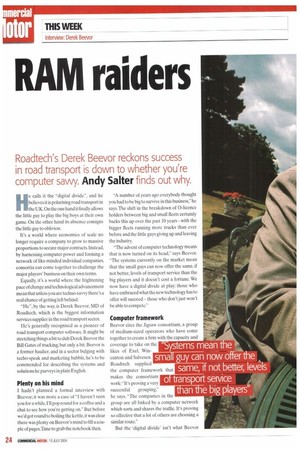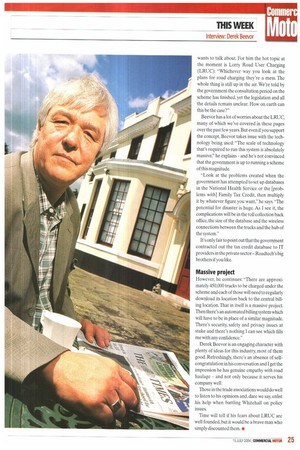RAM raiders
Page 24

Page 25

If you've noticed an error in this article please click here to report it so we can fix it.
Roadtech's Derek Beevor reckons success in road transport is down to whether you're
computer savvy. Andy Salter finds out why.
He calls it the "digital divide", and he believes it is polarising road transport in the UK. On the one hand it finally allows the little guy to play the big boys at their own game. On the other hand its absence consigns the little guy to oblivion.
It's a world where economies of scale no longer require a company to grow to massive proportions to secure major contracts. Instead, by harnessing computer power and forming a network of like-minded individual companies, consortia can come together to challenge the major players' business on their own terms.
Equally. it's a world where the frightening pace of change and technological advancement mean that unless you are techno-savvy there's a real chance of getting left behind.
"He-, by the way, is Derek Beevor, MD of Roadtech, which is the biggest information services supplier in the road transport sector.
He's generally recognised as a pioneer of road transport computer software. It might be stretching things a bit to dub Derek Beevor the Bill Gates of trucking, but only a bit. Beevor is a former haulier, and in a sector bulging with techo-speak and marketing babble, he's to be commended for describing the systems and solutions he purveys in plain English.
Plenty on his mind
I hadn't planned a formal interview with Beevor; it was more a case of "I haven't seen you for a while, I'll pop round for a coffee and a chat to see how you're getting on." But before we'd got round to boiling the kettle. it was clear there was plenty on Beevor's mind to fill a couple of pages.Time to grab the notebook then. "A number of years ago everybody thought you had to be big to survive in this business," he says. The shift in the breakdown of 0-licence holders between big and small fleets certainly backs this up over the past 10 years with the bigger fleets running more trucks than ever before and the little guys giving up and leaving the industry.
"The advent of computer technology means that is now turned on its head," says Beevor. "The systems currently on the market mean that the small guys can now offer the same, if not better, levels of transport service than the big players and it doesn't cost a fortune. We now have a digitaldivide at play: those who have embraced what the new technology has to offer will succeed those who don't just won't be able to compete."
Computer framework
Beevor cites the Jigsaw consortium, a group of medium-sized operators who have come together to create a firm with the capacity and coverage to take on the likes of Exel, Wincanton and Salvesen. Roadtech supplied the computer framework makes the consortium work: "It's proving a very successful grouping," he says. "The companies in the group are all linked by a computer network which sorts and shares the traffic, It's proving so effective that a lot of others are choosing a similar route."
o transport service
But the 'digital divide' isn't what Beevor wants to talk about. For him the hot topic at the moment is Lorry Road User Charging (LRUC): "Whichever way you look at the plans for road charging they're a mess. The whole thing is still up in the air. We're told by the government the consultation period on the scheme has finished, yet the legislation and all the details remain unclear. How on earth can this be the case?"
Beevor has a lot of worries about the LRUC, many of which we've covered in these pages over the past few years. But even if you support the concept, Beevor takes issue with the technology being used: "The scale of technology that's required to run this system is absolutely massive," he explains and he's not convinced that the government is up to running a scheme of this magnitude.
"Look at the problems created when the government has attempted to set up databases in the National Health Service or the [problems with] Family Tax Credit, then multiply it by whatever figure you want," he says. "The potential for disaster is huge. As I see it, the complications will be in the toll collection hack office, the size of the database and the wireless connections between the trucks and the hub of the system."
It's only fair to point out that the government contracted out the tax credit database to IT providers in the private sector — Roadtech's big brothers if you like.
Massive project
However, he continues: "There are approximately 450,000 trucks to be charged under the scheme and each of those will need to regularly download its location back to the central billing location. That in itself is a massive project. Then there's an automated billing system which will have to be in place of a similar magnitude. There's security, safety and privacy issues at stake and there's nothing I can see which fills me with any confidence."
Derek Beevor is an engaging character with plenty of ideas for this industry, most of them good. Refreshingly, there's an absence of selfcongratulation in his conversation and I get the impression he has genuine empathy with road haulage — and not only because it serves his company well.
Those in the trade associations would do well to listen to his opinions and, dare we say, enlist his help when battling Whitehall on policy issues.
Time will tell if his fears about LRUC are well founded, but it would be a brave man who simply discounted them. •






































































































































































































